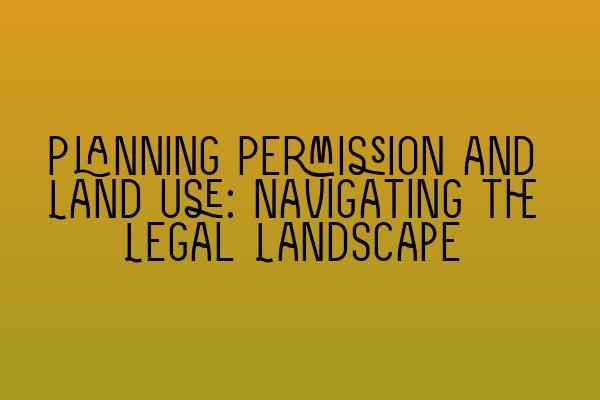Planning Permission and Land Use: Navigating the Legal Landscape
When it comes to property development, one of the most critical aspects to consider is planning permission and land use regulations. Whether you’re a property owner, developer, or investor, understanding the legal landscape surrounding these matters is essential to ensure compliance and avoid potential setbacks.
In this article, we will delve into the intricacies of planning permission and land use, providing you with an overview of the key concepts, processes, and considerations involved. So, let’s get started!
What is Planning Permission?
Planning permission is a legal requirement in the United Kingdom that grants the right to carry out specified development on a property or land. It is necessary for any development that involves a ‘material change of use’ or significant alterations to existing structures.
Obtaining planning permission involves submitting an application to the local planning authority, who assesses whether the proposed development aligns with the relevant policies and regulations. This process ensures that developments contribute to the overall well-being and sustainability of the local community.
Types of Planning Permission
In the UK, there are several types of planning permission, each catering to different aspects of property development. These include:
- Full Planning Permission: This type of permission grants the right to undertake the proposed development as outlined in the application.
- Outline Planning Permission: This type of permission establishes the principle of development on a site but leaves some of the specific details to be determined later.
- Listed Building Consent: When working with a listed building, additional consent is required to ensure any proposed alterations or renovations comply with historic preservation guidelines.
- Change of Use: If you intend to change the use of a property, such as converting a residential building into a commercial space, you will need to obtain change of use planning permission.
- Permitted Development: Certain minor development works are considered ‘permitted development’ and do not require planning permission. However, it is crucial to familiarize yourself with the specific limitations and regulations surrounding permitted development rights.
The Planning Application Process
Submitting a well-prepared planning application is crucial to increase the chances of a successful outcome. Here are the key steps involved in the planning application process:
- Preliminary Research: Before embarking on the application process, it is essential to conduct thorough research on the site and its planning history. This will provide valuable insights into potential challenges and inform your decision-making.
- Engage with Professionals: Seeking professional advice from a solicitor experienced in property law and a planning consultant can greatly assist with the application process. They can ensure that all necessary supporting documents, surveys, and reports are included in the submission.
- Prepare the Application: The application form must be completed accurately, providing detailed information about the proposed development, such as plans, elevations, site layouts, and any other relevant documentation.
- Submit the Application: Once all necessary documents are prepared, the application must be submitted to the local planning authority. It is important to keep track of the application’s progress and respond promptly to any queries or requests for additional information.
- Consideration and Decision: The local planning authority will assess the application against relevant policies, consultation responses, and other considerations. They will either approve the application, approve it with conditions, or reject it. It is important to review the decision thoroughly and seek professional advice if necessary.
- Appealing a Decision: If the application is refused, you have the right to appeal the decision to the Planning Inspectorate. An experienced solicitor can guide you through the appeals process and represent your interests.
Land Use and Zoning Regulations
Land use regulations dictate how a particular piece of land can be utilized within a specified jurisdiction. These regulations establish zoning categories that define the permitted uses, density, building heights, and other development restrictions applicable to different areas.
Understanding land use and zoning regulations is crucial for property owners and developers to ensure compliance and make informed decisions regarding their land or property. It helps in determining whether the intended use aligns with the existing zoning regulations or if any special approvals or variances are required.
Engaging with a land use solicitor can provide invaluable guidance in navigating the complexities of zoning regulations, especially when considering complex development projects that may require changes to the existing zoning rules.
Conclusion
Planning permission and land use regulations play a pivotal role in property development, ensuring that developments align with the well-being and sustainability of local communities. Understanding these legal requirements and processes is crucial to avoid potential setbacks and ensure compliance with the relevant policies.
If you require assistance with planning permission, land use, or any other property law matters, SQE Property Law & Land Law is here to help. Our team of experienced solicitors can provide expert advice and guide you through the intricacies of property law. Contact us today to discuss your legal needs!
Related Articles:
